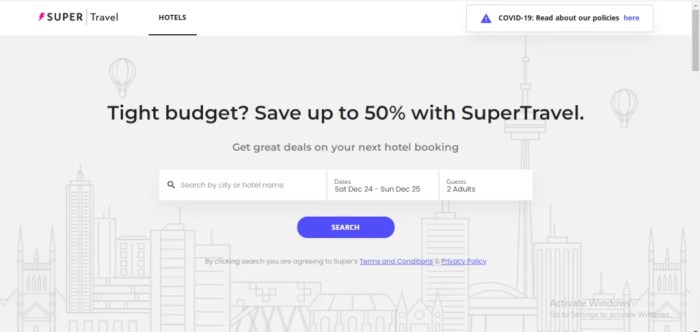How To Book The Cheapest Hotel Without Compromising Quality
How to Book the Cheapest Hotel Without Compromising Quality is your gateway to smart travel planning that balances affordability with comfort. With the ever-changing landscape of hotel pricing and the multitude of options available, it can sometimes feel overwhelming to find a great deal without sacrificing quality. This guide will equip you with essential insights and practical strategies to navigate the booking world, ensuring you can enjoy a wonderful stay without breaking the bank.
From understanding the factors that influence hotel prices to learning how to leverage discounts and negotiate better rates, you’ll discover the steps to maximize your travel budget. Whether you’re a seasoned traveler or planning your first trip, these tips will help you secure not only the best prices but also accommodations that meet your expectations for quality and service.
Understanding the Basics of Hotel Pricing
When planning a trip, understanding hotel pricing is crucial to finding the best deals. Several factors can influence the cost of a hotel room, including location, amenities, and the time of year. This knowledge can empower travelers to make informed choices and secure affordable accommodations without sacrificing quality.Various factors contribute to the fluctuation of hotel prices. The location of a hotel plays a significant role; those situated in tourist hotspots or city centers tend to be pricier due to higher demand.
Additionally, the amenities offered, such as complimentary breakfast, free Wi-Fi, and pool access, can also affect pricing. Moreover, hotels adopt different pricing models, ranging from dynamic pricing based on real-time demand and supply to fixed rates that remain constant regardless of external factors.
Factors Influencing Hotel Prices
Understanding the elements that impact hotel pricing can help travelers identify the best times to book. Here are some key factors:
- Location: Hotels in high-demand areas generally charge more due to their proximity to attractions and services.
- Amenities: Extra features like spas, gyms, and gourmet dining options can increase nightly rates.
- Booking Channel: Prices can vary depending on whether you book directly through the hotel or through third-party platforms.
- Time of Booking: Last-minute bookings can sometimes lead to discounts, while early reservations may secure better rates.
Types of Hotel Pricing Models
Hotels utilize various pricing strategies to maximize revenue. Here are the common models:
- Dynamic Pricing: Rates fluctuate based on current demand and booking patterns. For instance, hotels might raise prices during major events or holidays.
- Fixed Pricing: These rates remain consistent and do not change much, regardless of demand.
- Promotional Pricing: Special deals or discounts aimed at attracting guests during off-peak seasons.
- Package Pricing: Bundled offers that include accommodation along with services like meals or tours.
Peak Seasons Versus Off-Peak Seasons
Understanding peak and off-peak seasons is essential for optimizing hotel expenses. The peak season typically coincides with holidays, summer vacations, or major local events, causing room rates to surge. Conversely, off-peak seasons, such as winter months or periods of local inactivity, often feature significantly lower rates and fewer crowds.The impact of peak and off-peak seasons on hotel pricing is substantial.
For example, a standard hotel in a popular tourist destination may charge $300 per night during the summer peak but could drop to $150 per night during the winter off-peak. Recognizing these fluctuations enables savvy travelers to capitalize on off-peak pricing for better deals.
“Travelers can save significantly by scheduling their trips during off-peak seasons, taking advantage of lower hotel rates without compromising on quality.”
Researching Hotel Options
When it comes to booking the best hotel at the most affordable price, thorough research is key. Understanding where and how to look for options can save you both time and money while ensuring a pleasant stay. The right resources will not only help you find deals but also ensure that the quality of your accommodation meets your expectations.Utilizing reliable hotel booking websites and effective comparison tools can significantly enhance your hotel search process.
A smart approach involves gathering reviews and ratings from various sources to inform your decision. Below are some resources and strategies to consider.
Reliable Hotel Booking Websites
Finding the right hotel begins with knowing where to look. Here’s a list of dependable hotel booking websites that can help you discover various accommodations:
- Booking.com: Offers a wide range of hotels, from luxury to budget-friendly options, with user-friendly filters for easier navigation.
- Expedia: Known for package deals, it can save you money on flights and hotels booked together.
- Hotels.com: Features a rewards program that allows you to earn free nights after a certain number of bookings.
- Trivago: A metasearch engine that compares offers from various booking sites, helping you find the best price.
- Kayak: Another comparison tool that aggregates prices across multiple sites, offering insights on price trends.
Using Comparison Tools Effectively
Comparison tools are essential for ensuring you get the best deal available. Here are steps to maximize their use:
- Input your travel dates and destination accurately to ensure the most relevant results.
- Utilize filters to narrow down your choices based on price range, amenities, and hotel star ratings.
- Pay attention to the total cost, including taxes and fees, as these can vary significantly between sites.
- Review the cancellation policy and additional charges, such as parking or resort fees, that may not be included in the initial price.
- Regularly check prices as they can fluctuate based on demand, especially during peak seasons.
Gathering Hotel Reviews and Ratings
Evaluating hotel reviews and ratings is crucial in the decision-making process. A comprehensive checklist will help ensure you gather all necessary information:
- Check multiple review platforms: Use sites like TripAdvisor, Google Reviews, and the booking platform itself to get diverse perspectives.
- Look for recent reviews: Prioritize reviews from the last six months to ensure relevance to current conditions.
- Assess the overall rating: Focus on the average rating but also pay attention to the number of reviews to gauge reliability.
- Read detailed comments: Look for specific mentions of cleanliness, comfort, and service quality, as these factors can vary widely.
- Identify common praises and complaints: Take note of recurring themes in reviews to understand potential benefits or issues with the hotel.
By diligently researching options and carefully evaluating reviews, travelers can confidently book accommodations that balance quality and affordability.
Techniques for Finding Discounts
When it comes to booking a hotel, uncovering discounts can significantly reduce your costs without sacrificing quality. There are various techniques that savvy travelers can employ to find the best possible rates, ensuring that your stay is both enjoyable and budget-friendly. From loyalty programs to strategic booking times, here are some effective ways to save money on your next hotel reservation.
Methods for Uncovering Hidden Discounts
Finding discounts often requires a bit of detective work. Many hotels offer hidden deals that are not advertised openly. Here are some methods to uncover these offers:
- Check Multiple Booking Sites: Prices can vary widely across different platforms. Use comparison websites to see a range of prices and special offers.
- Sign Up for Newsletters: Many hotels and booking platforms send out exclusive deals to their mailing list subscribers. By signing up, you may receive special discounts directly in your inbox.
- Look for Package Deals: Sometimes, booking a hotel as part of a package deal that includes flights or car rentals can lead to substantial savings.
- Utilize Discount Codes: Websites that specialize in coupon codes often feature exclusive discounts for hotels. A simple search could lead you to a code that saves you money.
Loyalty Programs and Membership Benefits
Leveraging loyalty programs can provide considerable savings and additional perks during your hotel stay. Here’s how to make the most of these programs:
- Join Hotel Loyalty Programs: Many hotel chains offer points for every stay, which can be redeemed for free nights or upgrades. Joining these programs is often free and can lead to unexpected benefits.
- Utilize Credit Card Partnerships: Certain credit cards offer rewards points that can be converted into hotel stays or discounts with partnered hotels. This can be a great way to maximize your travel expenses.
- Take Advantage of Member Rates: Many hotels provide lower rates for members of their loyalty programs. It’s worth signing up to access these offers, especially if you travel frequently.
Timing Strategies for Booking
The timing of your booking can greatly influence the price you pay for your hotel room. Here’s a look at effective timing strategies:
- Last-Minute Bookings: While risky, last-minute bookings can yield significant discounts, particularly if hotels have unsold inventory. Apps and websites often list last-minute deals at reduced rates.
- Early Booking: Conversely, booking well in advance can secure lower prices, especially during peak travel seasons. Many hotels offer early bird discounts that can save you money.
- Travel During Off-Peak Times: Rates tend to be lower during off-peak seasons. Planning your trip during these times can lead to substantial savings on hotel stays.
Negotiating Better Rates

Source: fusechronicles.com
When it comes to booking a hotel, negotiating directly with staff can lead to significant savings without sacrificing quality. While many travelers may shy away from this practice, understanding how to effectively negotiate can make a substantial difference in your travel budget. Equipping yourself with a few strategies can empower you to secure better rates and enhance your overall experience.Negotiating with hotel staff is most effective in certain scenarios, particularly during check-in or when booking directly with the hotel.
Hotels often have flexibility in their pricing, especially during off-peak times or if they have many empty rooms. Here are some tips to keep in mind as you prepare to negotiate:
Effective Negotiation Tips
Understanding the best ways to negotiate can help you approach staff with confidence and increase your chances of success. Consider the following strategies when negotiating your hotel rate:
- Be Polite and Friendly: A courteous demeanor can go a long way. Being respectful and friendly may encourage staff to assist you in finding a better rate.
- Inquire About Discounts: Ask if there are any promotions, loyalty programs, or special rates available that you might qualify for.
- Highlight Loyalty: If you’re a returning guest, mention your previous stays and express your loyalty. Hotels often reward repeat customers.
- Ask for Upgrades: While negotiating, consider not only the price but also ask if there are any complimentary upgrades available with your booking.
- Time Your Request: Approach the front desk during slower hours when staff may have more time to accommodate your request.
These strategies can set a positive tone for your negotiation.
“Politeness costs nothing and buys everything.” – Unknown
Scenarios for Successful Negotiation
Certain situations are particularly conducive to negotiating better rates. Focus on these moments to maximize your chances of success:
- During Check-In: This is one of the best times to negotiate, as the hotel staff may have the discretion to adjust rates or offer room upgrades if they have available inventory.
- Last-Minute Bookings: Booking a room on the same day can sometimes lead to better rates, particularly if hotels are looking to fill rooms.
- Off-Peak Seasons: Traveling during low-demand periods can increase your chances of negotiating lower rates as hotels are eager to attract guests.
- When Booking Directly: Contacting the hotel directly instead of using third-party websites can lead to better deals, as hotels prefer to avoid commission fees.
By picking the right moments to negotiate, you can enhance your chances of landing a great deal.
Negotiation Script
Having a well-crafted script can help you articulate your requests confidently. Here’s a simple template to guide your negotiation:
“Hello [Hotel Staff Name], my name is [Your Name]. I’m excited about the possibility of staying here and wanted to ask if you have any available rates or promotions for my stay from [Start Date] to [End Date]. I’ve heard great things about this hotel, and as a returning guest/[insert any relevant loyalty], I’m hoping for a better rate. Is there any flexibility on the pricing or any upgrades available?”
Utilizing this script can pave the way for a smoother negotiation process. By being clear, concise, and polite, you’ll put yourself in a good position to receive the best possible rate.
Assessing Hotel Quality
When it comes to booking a hotel, price is only one piece of the puzzle. Evaluating hotel quality is crucial to ensure that your stay is comfortable and meets your expectations. Beyond just the cost, various factors contribute to the overall experience, including amenities, services, and location. By understanding what makes a hotel truly stand out, you can make informed decisions that enhance your travel experience.Several key factors should be considered when assessing hotel quality.
These include the range of amenities, the reputation of the hotel, and the overall condition of the property. A well-rounded evaluation will help you identify hotels that not only fit your budget but also provide the level of comfort and service you deserve.
Essential Amenities and Services
When evaluating hotel quality, certain amenities and services can significantly affect your stay. Identifying what is essential for you can guide your choice. Here’s a checklist of amenities and services to consider:
- Cleanliness: A clean environment is non-negotiable for a pleasant stay.
- Wi-Fi Access: Fast and free internet is crucial for both leisure and business travelers.
- Breakfast Options: Complimentary breakfast can save you both time and money.
- Parking Availability: Ensure there is convenient parking if you’re traveling by car.
- Fitness Facilities: Access to a gym or pool can enhance your overall experience, especially for longer stays.
- Accessibility Features: Look for accommodations that cater to individuals with disabilities, ensuring everyone can enjoy their stay.
Each of these amenities adds value to your hotel experience and can elevate your stay from ordinary to exceptional.
“Quality service and facilities can transform a good trip into a great one.”
Importance of Location and Accessibility
Location plays a pivotal role in assessing hotel quality. A hotel that is conveniently situated can greatly enhance your overall travel experience. Proximity to attractions, public transport, and essential services can save you time and money during your trip. When assessing a hotel’s location, consider the following aspects:
- Proximity to Attractions: Being close to tourist spots can facilitate easier exploration and more enjoyable experiences.
- Transport Links: Access to public transport can make it simpler to navigate the city and reach your desired destinations.
- Neighborhood Safety: A safe area should be a top priority, ensuring peace of mind during your stay.
- Restaurants and Supermarkets: Having dining options and grocery stores nearby can enhance convenience during your trip.
Evaluating these factors will not only guide you toward making a well-informed hotel choice but also allow you to enjoy your travel experience to the fullest. Remember, the right hotel can set the tone for your entire trip.
Utilizing Alternative Accommodations
Exploring alternative accommodations can be a game-changer in your travel experience. While traditional hotels have their benefits, options like hostels and vacation rentals are becoming increasingly popular among travelers seeking both affordability and unique experiences. Understanding the pros and cons of these alternatives can help you make an informed decision that balances cost and quality.When comparing traditional hotels with alternative lodging options, it’s essential to look at various factors such as pricing, services, and overall experience.
This assessment will help you choose the best option that aligns with your travel needs and budget.
Comparison of Lodging Options
The table below highlights the distinct features, price points, and quality indicators of traditional hotels, hostels, and vacation rentals. By examining these factors, you can gain insights into which type of accommodation may be the most suitable for your trip.
| Accommodation Type | Price Range (per night) | Quality Indicators | Pros | Cons |
|---|---|---|---|---|
| Traditional Hotels | $100 – $300 | Star ratings, guest reviews |
|
|
| Hostels | $20 – $70 | Bunk bed setups, communal areas |
|
|
| Vacation Rentals | $50 – $250 | Owner ratings, unique property types |
|
|
“Choosing the right accommodation can significantly affect your travel experience, combining comfort, cost, and convenience.”
Planning Ahead for Travel

Source: livewell.com
Setting a travel budget is essential for enjoying a stress-free trip without overspending. A well-defined budget helps prioritize spending, allowing travelers to allocate funds effectively between lodging, activities, and meals. Sticking to this budget not only prevents financial strain but also enhances the overall travel experience by ensuring that money is available for unexpected expenses or additional experiences.When it comes to planning travel itineraries that accommodate cost-effective lodging, it’s crucial to consider factors like travel dates, destination, and the type of accommodation desired.
Early planning can significantly enhance the chances of finding excellent deals. Researching areas that offer affordable lodging options while still being conveniently located near attractions can also save both time and money.
Setting a Travel Budget
Creating a travel budget involves several steps to ensure that all potential expenses are accounted for. The following points Artikel the key components of effective budgeting:
- Determine Overall Costs: Estimate total travel costs, including flights, accommodation, dining, activities, and transportation.
- Prioritize Expenses: Identify which aspects of the trip are most important, such as experiences or comfortable lodging.
- Allocate Funds: Break down the budget by category, assigning specific amounts to each expense type.
- Monitor Spending: Keep track of expenses during the trip to ensure adherence to the budget and make adjustments when necessary.
Strategies for Cost-Effective Itineraries
Planning travel itineraries that are cost-effective requires a balance of timing and location. The following strategies are beneficial for achieving this:
- Flexible Travel Dates: Being open to changing your travel dates can lead to significant savings, as flights and hotels often vary in price based on demand.
- Research Local Events: Check local calendars for events that may increase accommodation prices. Avoid booking during peak seasons or major events.
- Stay Outside Busy Areas: Consider lodging in nearby neighborhoods instead of tourist hotspots to lower accommodation costs.
- Utilize Package Deals: Look for package deals that include flights and hotels, as these can often be cheaper than booking separately.
Timelines for Booking Flights and Hotels
Booking flights and hotels at the right time is crucial for maximizing savings. Here are some timelines to consider:
- Flights: Aim to book your flights at least 2 to 3 months in advance for domestic travel and 4 to 6 months for international trips to secure the best rates.
- Hotels: For hotels, try to book at least a month in advance, but keep an eye out during the off-season for potential last-minute deals.
- Monitor Price Trends: Use fare comparison websites to track flight and hotel prices, setting alerts for price drops.
“By planning ahead and sticking to a budget, travelers can enjoy their trips without financial worries, all while securing comfortable accommodations.”
Reviewing Your Final Choices

Source: knowinsiders.com
Before you finalize your hotel booking, it’s essential to review your choices thoroughly. This step ensures that you not only secure the best rate but also confirm that the hotel meets your expectations for quality, amenities, and location. Taking a moment to double-check your options can save you from potential inconveniences during your trip.Cross-verifying hotel details is a crucial step in the decision-making process.
It allows you to confirm the information you’ve gathered from different sources and make an informed choice. To do this effectively, consider the following points:
Steps for Finalizing Your Hotel Choice
Begin by creating a checklist to ensure that every important aspect of your booking is covered. Here are steps to help you finalize your decision:
- Review hotel ratings and guest reviews on multiple platforms such as Google, TripAdvisor, and Booking.com.
- Check the hotel’s official website for up-to-date information on amenities and promotions.
- Contact the hotel directly to verify details such as room availability, policies on cancellations or changes, and any additional fees.
- Look for recent reviews or blog posts that provide insights into the current state of the hotel.
To ensure a seamless booking experience, utilize this checklist before confirming your reservation:
Booking Conditions Checklist
Having a checklist will help you make sure you’ve met all necessary conditions before finalizing your hotel choice. Important items to consider include:
- Room type and preferences: Double-check that the room matches what you need (e.g., number of beds, view, accessibility).
- Cancellation policy: Understand the terms regarding cancellations or changes to your booking.
- Payment terms: Confirm what forms of payment are accepted and if a deposit is required.
- Inclusions: Make sure you know what’s included in the price (e.g., breakfast, Wi-Fi, parking).
- Check-in and check-out times: Verify the times to avoid any scheduling conflicts.
Remember, taking these extra steps can significantly enhance your travel experience by ensuring that you’re fully informed and prepared. A well-reviewed hotel can be the difference between a pleasant stay and a disappointing one.
Last Point
In conclusion, mastering the art of booking the cheapest hotel without compromising quality is achievable with the right strategies and knowledge. By understanding pricing models, taking advantage of discounts, and assessing accommodations wisely, you can enhance your travel experience while keeping your budget intact. Remember, planning ahead and being proactive in your search will lead to unforgettable stays that leave both your wallet and your spirit satisfied.
Detailed FAQs
What is the best time to book a hotel for the lowest rates?
The best time to book a hotel often varies by destination, but generally, booking 2-3 months in advance for popular destinations can yield the best rates, especially during peak seasons.
Are there any specific websites that offer the best hotel deals?
Some popular websites known for great hotel deals include Booking.com, Expedia, and Hotels.com, but always compare prices across multiple sites to ensure you’re getting the best deal.
Can I negotiate hotel rates after making a reservation?
Yes, it’s possible to negotiate after booking, especially if you find a better deal elsewhere. Contact the hotel directly and mention the lower rate; they may match it or offer additional perks.
How do loyalty programs help in booking cheaper hotels?
Loyalty programs often provide exclusive discounts, free upgrades, and points that can be redeemed for future stays, making them a valuable resource for frequent travelers.
Is it worth considering alternative accommodations like hostels or vacation rentals?
Yes, alternative accommodations can offer significant savings and unique experiences. Evaluating their pros and cons against traditional hotels will help you decide what fits your travel style best.









